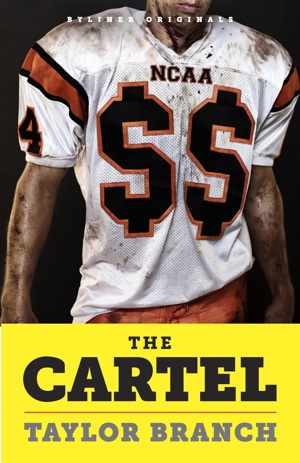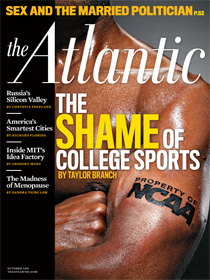The RTC Interview Series: One On One With Taylor Branch
Posted by nvr1983 on September 29th, 2011Rush The Court is back with another edition of One on One: An Interview Series, which we will bring you periodically throughout the year. If you have any specific interview requests or want us to interview you, shoot us an email at rushthecourt@yahoo.com.
This time our interview subject is Taylor Branch, who is best known for his Pulitzer Prize-winning Parting the Waters: America in the King Years, 1954-63 and receiving a MacArthur Foundation genius grant. However, Branch took something of a sabbatical from his usual works on history to study the NCAA in “The Shame of College Sports” that was published in this month’s edition of The Atlantic and a recently released Byliner.com e-publication, “The Cartel: Inside the Rise and Imminent Fall of the NCAA”. Branch’s recent work has generated a lot of discussion and has led Frank Deford to write that it “may well be the most important article ever written about college sports.” When we were extended the opportunity to speak with him on the subject, we jumped at it and what follows is our discussion with him.
Rush the Court: When we found out that we were going to speak with you we asked some of the other sportswriters that we knew what their thoughts were about your article, and we were surprised to hear that almost all of them had heard about it but very few of them had read the 14,573 words. For those people, could you summarize what the major thesis of your piece is about, because I feel like many people have read the critiques of your essay, but have not read the original article and miss some of the meat of it, which is where I think a lot of the substance is?
Taylor Branch: Right. It has kind of gone at warp speed right past me because there is already an e-book just days after the article came out. An original e-book company asked me if I had any more material and I had another 10,000 words so this is an extended version that includes more basketball. That is already an original e-book. That is what I was doing a Twitter chat about today. My kids are laughing at me because I have been print author for 40 years and now in just a week or 10 days since this thing went on a newsstand I already have an original e-book expansion called “The Cartel,” which is 25,000 words, and I had a Twitter chat just over an hour ago, which I didn’t even know how to do. [laughs] Obviously, I have stumbled into something. I just did this as a temporary magazine assignment between books and didn’t really realize that it was going to get this much attention. It began and is a survey of college sports including its history. I am a historian. I write about history for a living. I have been writing history books for 40 years. They asked me to write about it because I don’t write about sports so I could come at it fresh. My basic question was why is the United States the only country in the world that plays big-money sports at institutions of higher learning and where does that come from in our history. A lot of the book is that. Where did the NCAA come from? Where does it derive its powers and where it came from? I went to North Carolina and everybody in North Carolina cares about basketball. Where does the money from March Madness go? Inevitably, the focus became more and more on money because money is the driving force of college sports. And more and more for me the focus became how do we justify the amateurism rules that the NCAA applies to the players in college sports, but not to the coaches and the schools themselves, who have been making more and more money and marketing themselves more aggressively. Ultimately, I came to the conclusion that you cannot justify these rules. The sum total of what holds them up is like The Wizard of Oz because we put up with it. We don’t put up with it for the adults or coaches, but we do impose it on the kids. I think those rules cannot be justified. That really touched a nerve because people are saying that I am demanding to pay college athletes. That’s not quite right. I am not demanding that any college pay an athlete. What I think you cannot justify is the college banding together and saying that we refuse and will conspire not to pay the athletes anything more than the value of your scholarship. I don’t think that can be justified. I think it is doomed. I think it is already falling apart. That is the basic thrust of my article.













































